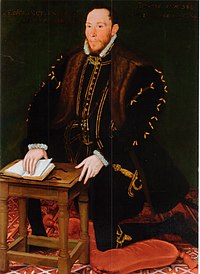
Sir Henry Percy, nicknamed Hotspur or Harry Hotspur, was an English knight who fought in several campaigns against the Scots in the northern border and against the French during the Hundred Years' War. The nickname "Hotspur" was given to him by the Scots as a tribute to his speed in advance and readiness to attack. The heir to a leading noble family in northern England, Hotspur was one of the earliest and prime movers behind the deposition of King Richard II in favour of Henry Bolingbroke in 1399. He later fell out with the new regime and rebelled, and was slain at the Battle of Shrewsbury in 1403 at the height of his fame.

"Barbara Allen" is a traditional folk song that is popular throughout the English-speaking world and beyond. It tells of how the eponymous character denies a dying man's love, then dies of grief soon after his untimely death.

"The Ballad of Chevy Chase" is an English ballad, catalogued as Child Ballad 162. There are two extant ballads under this title, both of which narrate the same story. As ballads existed within oral tradition before being written down, other versions of this once-popular song also may have existed.

Thomas Percy was Bishop of Dromore, County Down, Ireland. Before being made bishop, he was chaplain to George III of the United Kingdom. Percy's greatest contribution is considered to be his Reliques of Ancient English Poetry (1765), the first of the great ballad collections, which was the one work most responsible for the ballad revival in English poetry that was a significant part of the Romantic movement.

"Sir Patrick Spens" is one of the most popular of the Child Ballads, and is of Scottish origin. It is a maritime ballad about a disaster at sea.
"The Bonnie Earl o' Moray" is a popular Scottish ballad, which may date from as early as the 17th century.
Sir James Douglas, 2nd Earl of Douglas and Mar was an influential and powerful magnate in the Kingdom of Scotland.

The Battle of Otterburn, also known as the Battle of Chevy Chase, took place according to Scottish sources on 5 August 1388, or 19 August according to English sources, as part of the continuing border skirmishes between the Scots and English.

Otterburn is a small village in Northumberland, England, 31 miles (50 km) northwest of Newcastle upon Tyne on the banks of the River Rede, near its confluence with the Otter Burn, from which the village derives its name. It lies within the Cheviot Hills about 16 miles (26 km) from the Scottish border. The parish of Otterburn is at the heart of Redesdale, a Northumbrian upland valley.

"The Raggle Taggle Gypsy" (Roud 1, Child 200), is a traditional folk song that originated as a Scottish border ballad, and has been popular throughout Britain, Ireland and North America. It concerns a rich lady who runs off to join the gypsies (or one gypsy). Common alternative names are "Gypsy Davy", "The Raggle Taggle Gypsies O", "The Gypsy Laddie(s)", "Black Jack David" (or "Davy") and "Seven Yellow Gypsies".
"Geordie" is an English language folk song concerning the trial of the eponymous hero whose lover pleads for his life. It is listed as Child ballad 209 and Number 90 in the Roud Folk Song Index. The ballad was traditionally sung across the English speaking world, particularly in England, Scotland and North America, and was performed with many different melodies and lyrics. In recent times, popular versions have been performed and recorded by numerous artists and groups in different languages, mostly inspired by Joan Baez's 1962 recording based on a traditional version from Somerset, England.

The Laidly Worm of Spindleston Heugh, also known as The Laidly Worm of Bamborough, is a Northumbrian ballad about a princess who is changed into a dragon.
"The Fair Flower of Northumberland" is a folk ballad.
Lord Lovel is an English-language folk ballad that exists in several variants. This ballad is originally from England, originating in the Late Middle Ages, with the oldest known versions being found in the regions of Gloucestershire, Somerset, Worcestershire, Warwickshire, and Wiltshire.
Willie o Couglas Dale or Willie O Douglas Dale is a traditional English-language folk song.
"The Knight and the Shepherd’s Daughter" is an English ballad, collected by Francis James Child as Child Ballad 110 and listed as number 67 in the Roud Folk Song Index.

"The Dowie Dens o Yarrow", also known as "The Braes of Yarrow" or simply "Yarrow", is a Scottish border ballad. It has many variants and it has been printed as a broadside, as well as published in song collections. It is considered to be a folk standard, and many different singers have performed and recorded it.
The Death of Parcy Reed is a Border ballad concerning the betrayal and murder of Percival Reed, believed to have been Laird of Troughend in Redesdale, Northumberland, in late 16th century England. It is Child ballad number 193 and its Roud number is 335.
Earl Rothes is an English-language folk song. Child offers no comment on the ballad beyond its basic story, listing it among the final ballads in a five-volume work that covered 305 of the form.
The Earl of Westmorland (ballad) or "The Earle of Westmorlande" is a Scottish ballad, catalogued as Child Ballad 177 and with a Roud Index number of 4007. It is related to the events in the ballads "The Rising in the North" and "Northumberland betrayed by Douglas". The ballad opens with the following verse:










